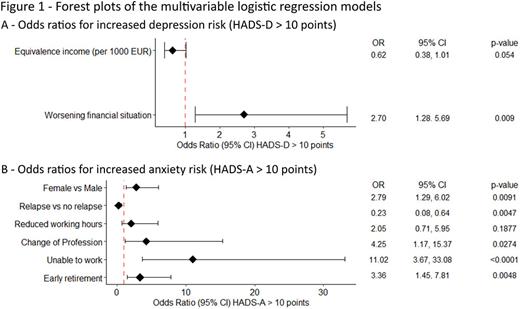Abstract
Background and Methods In the German AMLCG Survivorship study, we included former AML patients from the AMLCG 1999, 2004, 2008 trials and the AMLCG patient registry, who survived at least 5 years after their initial diagnosis (AML-LTS). Our participants provided information on life satisfaction, quality of life as well as a number of psychological outcomes. Here, we analyzed the hospital anxiety and depression scale questionnaire and present results with respect to severity of observed anxiety (HADS-A) and depression scores (HADS-D), as well as an exploratory analysis to identify major risk factors. We analyzed our data using absolute and relative frequencies. Categorical variables were compared by chi-squared tests. Univariate and multivariable logistic regression models were fitted to analyze the risk of increased anxiety or depression scores.
Results 427 AML-LTS participated in this study 5 to 18.6 years after their initial AML diagnosis. Overall, long term survivors showed HADS depression values between 0 and 19 with higher values indicating more severe depression. On average, former patients scored 4.35 (SD=3.8) points. Based on the classification proposed by Zigmond et al., 77.5% (331/420) showed normal depression scores (range: 0-7), 12.9% (55/420) borderline depression scores (8-10) and 8% (34/420) high scores (>10). Anxiety scores ranged between 0 and 20. Average score was 5.55 (SD: 4.01). Anxiety seem to be a more prominent problem in former AML patients. 73.3% (313/418) showed a normal score, 13.3% (57/418) a borderline score and 11.2% (48/418) a high score.
While depression severity was equally distributed between sexes (P >.05), anxiety is more prominent in women (male cases 10/182, 5.5% vs. female cases 38/236, 16.1%, P = .003). Older participants show a decreased risk for high (>10) anxiety scores (odds ratio per 10 years of age (OR): .776, 95% confidence interval (CI): .618-.970), but not for depression (P >.05). Time since initial diagnosis did not associate with depression or anxiety (P > .05). The equivalence income (household income in EUR, dependent on household size) was associated with depression risk (OR: .54, 95%CI: .34-.88, per 1000 EUR), but not with anxiety (P > .05). Changes in the occupational situation (due to AML) impacts the chance for high depression (P = .001) and high anxiety scores (P < .001). Especially, being unable to work at all showed an elevated risk for high depression (5/24, 21%) and anxiety (9/24, 37%) scores. Worsening of the participant's financial situation was associated with an increased risk for high depression (19/128, 14.8%, P < .001) and high anxiety (25/127, 19.7%, P < .001). Furthermore, AML- and therapy-related variables (de novo AML, cytogenetic risk, allogeneic stem cell transplantation vs chemotherapy only, as well as experiencing one or more relapses) were not associated with depression or anxiety (P > .05) in this univariate analysis.
All factors analyzed above were also used as risk factors in multivariable logistic regression models, within a backward variable selection approach with likelihoods ratio test. The final model for increased depression scores (HADS-D >10) contained the equivalence income (P = .056) as well as change in the financial situation (OR: 2.7, 95%CI: 1.28-5.69, P = .009) (Figure 1A). The latter confirmed the univariate finding that worsening financial situation is a risk factor for increased depression risk in long term survivors. The final model for increased anxiety scores (HADS-A >10) confirmed female sex (OR: 2.79, 95%CI: 1.29-6.02, P = .009), change in the occupational situation (P < .001, ORs are given in Figure 1B for the individual characteristics) as major risk factors for increased anxiety. Experiencing one or more relapses after AML seems to reduce the risk for anxiety (OR: .23, 95%CI: .08-.64, P = .005) (Figure 1B).
Discussion Our data shows that anxiety and depression are relevant health problems for ca. 20%-25% of long-term survivors. Furthermore, women seems to be more prone to exhibit anxiety after AML. Interestingly, experiencing at least one relapse seems to reduce the chance for increased anxiety. The association of occupational and/or financial situation with increased anxiety or depression risk suggests a need for the management of these factors to mitigate adverse effects. Overall, our data may be useful to guide aftercare for former AML patients with respect to their psychological well-being.
Disclosures
Krug:, Sanofi: Honoraria; AbbVie: Honoraria; BMS: Honoraria; , Leo Pharma,: Honoraria. Metzeler:Jazz Pharmaceuticals: Consultancy; AbbVie: Honoraria; Novartis: Consultancy, Honoraria; BMS/Celgene: Consultancy, Honoraria; Pfizer: Consultancy, Honoraria; Curis: Research Funding.
Author notes
Asterisk with author names denotes non-ASH members.


This feature is available to Subscribers Only
Sign In or Create an Account Close Modal